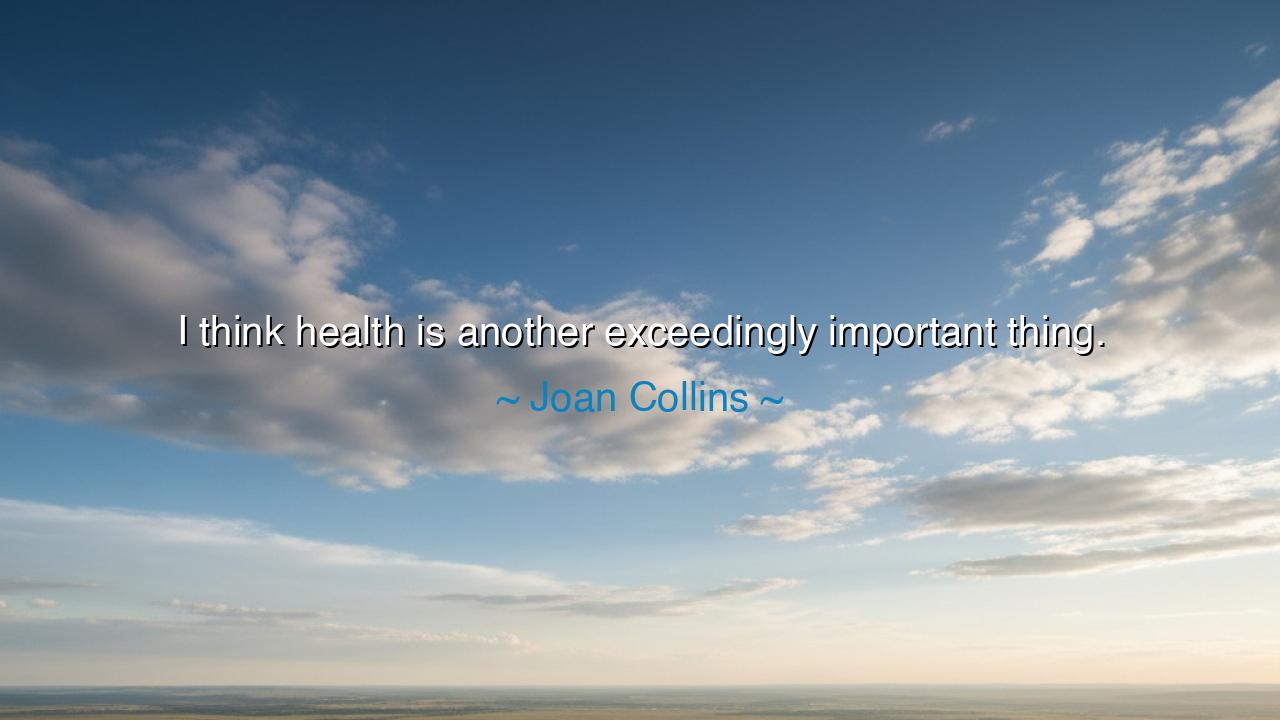
I think health is another exceedingly important thing.






The Crown of Life
Hear now the words of Joan Collins, a woman of grace and endurance, who, having lived through fame, fortune, and the endless turning of life’s seasons, spoke with simple wisdom: “I think health is another exceedingly important thing.” These words, though brief, shine like gold refined by experience. They are not the idle remark of one untouched by hardship, but the distilled truth of a life lived in full awareness of time’s power. For beneath their simplicity lies an ancient law—that health is the crown upon the head of the living, unseen by those who wear it until it is lost.
The Meaning of the Teaching
Collins’s words remind us that health is not a mere condition of the body, but the foundation of all endeavor. Wealth, beauty, fame, ambition—these are fleeting lights that fade when the flame of vitality grows dim. To say that health is “exceedingly important” is to acknowledge that it is the root of strength, joy, and purpose. Without it, even the greatest achievements turn hollow. Yet when one guards their health—of body, of mind, and of spirit—they gain mastery over life itself. The ancients called this the art of balance, the harmony between living fully and living wisely.
The Origin of the Words
Joan Collins, an actress of legend and longevity, has walked through the labyrinth of fame for decades, enduring the shifting tides of youth and age with resilience. Her reflection on health springs from this long journey—from the awareness that beauty fades, applause quiets, and fortune shifts, yet one’s well-being remains the truest measure of richness. Having survived illness, loss, and the unrelenting pace of her career, she came to see health not as a luxury, but as a treasure that demands reverence. Her words are not the philosophy of a physician but the wisdom of a survivor—a woman who has tasted both the fragility and the endurance of life.
The Parable of the Emperor’s Physician
In the annals of the East, there is a tale of an emperor who sought immortality. He summoned the greatest physicians of his realm, offering them gold beyond measure if they could preserve his youth. They brought him rare herbs, elixirs, and potions, but none could halt the passage of time. Finally, an old healer approached and said, “Majesty, I cannot give you eternity, but I can give you strength enough to live your days well.” The emperor asked what this strength required, and the healer replied, “Discipline, gratitude, and rest. For those who honor their health shall find eternity in every breath.” And though the emperor never gained endless life, he ruled long and wisely, for he had learned that the true secret of immortality lies in vitality.
The Harmony of Body and Spirit
Health, as Collins reminds us, is not limited to the physical realm. It is the unity of body, mind, and spirit, each nourishing the other. The body provides movement, the mind gives purpose, and the spirit infuses them with meaning. When one neglects any of these, imbalance arises. A strong body cannot endure long with a weary heart; a sharp mind dulls if the body falters. Thus, the wise live with mindfulness—feeding the body with nourishment, the mind with wisdom, and the spirit with gratitude. Collins’s insight, though spoken in modern times, echoes the teachings of the sages: to care for one’s health is to honor the gift of life itself.
The Reflection of Age and Experience
Joan Collins’s perspective carries the weight of years. In youth, health is taken for granted; the body feels invincible, the days unending. But with the passing of seasons, one learns that every heartbeat is a miracle and every morning a renewal. Her words whisper a truth known to elders across ages: health is the quiet wealth of the wise. Many spend their years chasing external glory, only to find that the truest form of abundance lies in the ability to rise each day with strength and peace. In this way, Collins joins the timeless chorus of voices—from philosophers to healers—who remind us that life’s greatest luxury is simply the ability to live it well.
The Lesson for the Generations
Therefore, O listener, let this teaching dwell in your heart: guard your health as you would guard treasure. Do not wait until pain becomes your teacher. Eat with mindfulness, rest without guilt, move with joy, and think with clarity. Let your habits be a daily offering to the temple that is your body. Cultivate discipline, but also kindness toward yourself, for health is not perfection—it is balance. Seek harmony over indulgence, and gratitude over neglect. For the one who tends their well-being tends also to their destiny.
The Eternal Counsel
So let the words of Joan Collins echo through the corridors of time: “Health is another exceedingly important thing.” In their simplicity lies the wisdom of centuries. Wealth fades, beauty wanes, fame grows quiet—but health, once lost, is mourned above all. Let every generation remember this truth: to live wisely is to live healthfully, and to cherish one’s vitality is to honor the divine gift of life. For health is not merely the absence of illness—it is the radiant harmony of a soul that walks the earth with strength, gratitude, and grace.






AAdministratorAdministrator
Welcome, honored guests. Please leave a comment, we will respond soon